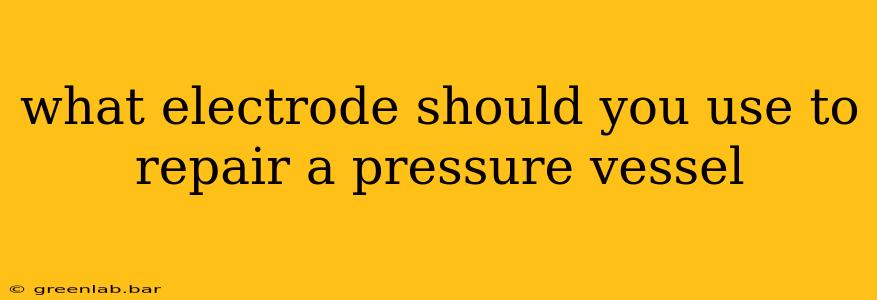Repairing a pressure vessel requires precision and expertise. The selection of the appropriate electrode is crucial for ensuring the structural integrity and safety of the vessel after repair. This guide will delve into the factors influencing electrode selection for pressure vessel repairs, offering a comprehensive overview for professionals in the field.
Understanding the Importance of Electrode Selection
The electrode acts as the source of weld metal in the repair process. Its composition directly affects the weld's metallurgical properties, influencing factors like strength, ductility, toughness, and corrosion resistance. Using an incorrect electrode can lead to:
- Weld defects: Porosity, cracks, incomplete fusion, and slag inclusions can compromise the vessel's integrity.
- Reduced strength: A weaker weld joint increases the risk of failure under pressure.
- Corrosion susceptibility: Improper electrode selection can result in welds more prone to corrosion, leading to premature failure.
Factors Influencing Electrode Choice
Several critical factors must be considered when choosing an electrode for pressure vessel repair:
1. Base Metal Composition:
The chemical composition of the pressure vessel's base metal dictates the required electrode type. Matching the electrode's chemical composition to the base metal ensures proper weld penetration and metallurgical compatibility. Common base metals include:
- Carbon Steels: These require electrodes with similar carbon content to avoid cracking and maintain weld toughness.
- Low Alloy Steels: These necessitate electrodes specifically formulated to match the alloying elements in the base metal.
- Stainless Steels: Stainless steel pressure vessels require electrodes designed for specific stainless steel grades (e.g., 304, 316) to maintain corrosion resistance.
2. Welding Process:
The chosen welding process (e.g., Shielded Metal Arc Welding (SMAW), Gas Metal Arc Welding (GMAW), Gas Tungsten Arc Welding (GTAW)) impacts electrode selection. Each process requires different electrode types and configurations.
- SMAW (Stick Welding): Uses coated electrodes, often identified by a classification number indicating their properties.
- GMAW (MIG Welding): Employs a continuously fed wire electrode, offering variations in composition and shielding gas.
- GTAW (TIG Welding): Utilizes a non-consumable tungsten electrode, and the filler metal is added separately.
3. Operating Conditions:
The pressure vessel's operating environment influences electrode choice. Factors to consider include:
- Temperature: High-temperature applications necessitate electrodes with superior creep resistance and high-temperature strength.
- Corrosion: Aggressive environments might require electrodes with enhanced corrosion resistance properties.
- Pressure: The operating pressure dictates the required strength and ductility of the weld.
4. Codes and Standards:
Pressure vessel repairs must adhere to stringent codes and standards, such as ASME Section VIII, Division 1. These codes specify the acceptable types of electrodes and the required welding procedures. Following these standards is vital for ensuring the repaired vessel meets safety regulations.
Common Electrode Types for Pressure Vessel Repair
While numerous electrode types exist, some are commonly employed for pressure vessel repairs:
- E7018: A popular SMAW electrode known for its excellent toughness and low hydrogen content, suitable for many carbon and low-alloy steels.
- E308L-16: A low-carbon stainless steel electrode often used for repairing stainless steel pressure vessels.
- ER308LSi: Similar to E308L-16 but designed for GMAW applications.
- Various GTAW filler metals: Chosen based on the specific grade of stainless steel or other alloys being welded.
Note: This is not an exhaustive list. The choice depends heavily on the specific vessel and repair requirements.
Conclusion: Prioritize Safety and Compliance
Selecting the correct electrode for pressure vessel repair is not a decision to be taken lightly. It's crucial for ensuring the long-term safety and reliability of the repaired vessel. Always consult the relevant codes and standards, and seek the expertise of qualified welding engineers to determine the most suitable electrode for the specific repair task. Prioritizing safety and compliance is paramount in this critical aspect of pressure vessel maintenance.

